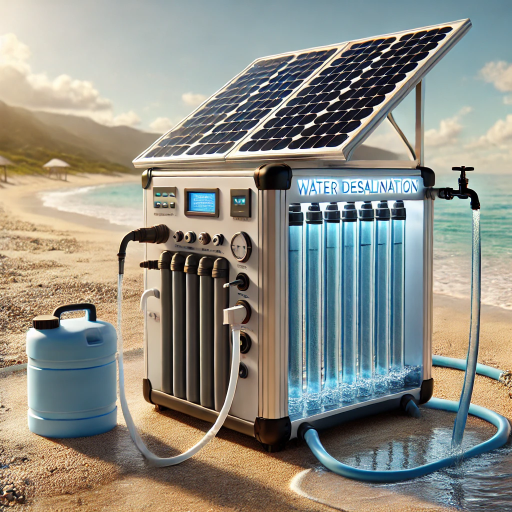Integrated Energy-Based Portable Water Desalination Technique to Empower Communities Facing Water Crises:
Water scarcity is a global challenge affecting millions of people, especially in arid and semi-arid regions. The growing demand for fresh water, coupled with the depletion of natural resources has necessitated the development of innovative water desalination technologies.
Objective
The primary objective of the research is to develop an integrated, energy-efficient, and portable water desalination system that can be deployed in regions facing acute water shortages. The system aims to utilize renewable energy sources, ensuring sustainability and accessibility for communities with limited infrastructure.
Development Stages
Design and Prototyping: We have designed a compact desalination unit capable of removing salt and other impurities from seawater or brackish water. The unit is integrated with renewable energy sources such as solar panels and wind turbines to power the desalination process.
Energy Integration: To ensure a continuous water supply, the system integrates solar, wind, and hydropower to provide a reliable source of energy.
Membrane Technology: The desalination process relied on advanced membrane technology, specifically reverse osmosis (RO) and forward osmosis (FO). The choice of membrane material and configuration was critical to ensure high water recovery rates and low energy consumption.
Field Testing: The prototype was tested in various field conditions, including coastal and inland areas with limited water access. The performance metrics included water output, energy consumption, and the quality of desalinated water.
Potential Impact
Empowerment of Vulnerable Communities: The system can provide a reliable source of clean water, empowering communities in water-scarce regions to meet their daily needs and improve their quality of life.
Disaster Relief: In the event of natural disasters, where water infrastructure is often compromised, the portable desalination unit can be quickly deployed to provide immediate relief.
Sustainable Development: The use of renewable energy sources promotes sustainable development and reduces dependence on fossil fuels, contributing to global efforts to combat climate change.
Economic Benefits: The low operational costs and potential for local manufacturing could stimulate economic growth in regions where the system is implemented, creating jobs and fostering innovation.




